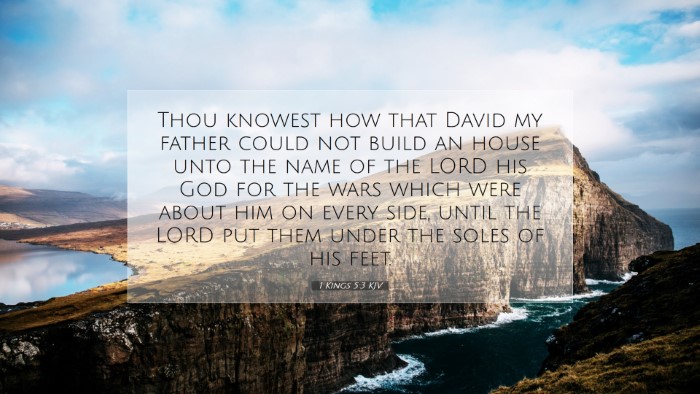Old Testament
Genesis Exodus Leviticus Numbers Deuteronomy Joshua Judges Ruth 1 Samuel 2 Samuel 1 Kings 2 Kings 1 Chronicles 2 Chronicles Ezra Nehemiah Esther Job Psalms Proverbs Ecclesiastes Song of Solomon Isaiah Jeremiah Lamentations Ezekiel Daniel Hosea Joel Amos Obadiah Jonah Micah Nahum Habakkuk Zephaniah Haggai Zechariah Malachi1 Kings 5:3
1 Kings 5:3 KJV
Thou knowest how that David my father could not build an house unto the name of the LORD his God for the wars which were about him on every side, until the LORD put them under the soles of his feet.
1 Kings 5:3 Bible Commentary
Bible Commentary on 1 Kings 5:3
Verse: "Thou knowest that David my father could not build a house unto the name of the LORD his God for the wars which were about him on every side, until the LORD put them under the soles of his feet."
Contextual Analysis
1 Kings 5 opens with a crucial transition in the history of Israel. Solomon, David's son, is assuming the throne and preparing to undertake a significant project: the construction of the Temple of the Lord.
The verse establishes a retrospective context, emphasizing David’s heart for God but acknowledging the military distractions that prevented him from completing this divine task. The reference to "wars on every side" highlights the tumultuous period of David’s reign where he fought numerous battles to secure the nation.
Theological Insights
- David's Limitations: Despite his fervent desire to build a temple for the Lord, David was constrained by his role as a warrior king. This situation illustrates God's sovereignty in directing the course of events according to His divine purposes.
- Divine Timing: The text suggests a theological principle that God has a specific timeline for His plans. The construction of the temple was not part of God's will for David but rather for Solomon, underlining the importance of recognizing and accepting God's timing in our lives.
- War and Worship: The juxtaposition of David's martial duties and his desire to build a house for God illustrates the tension that often exists between the physical and spiritual realms of life. Worship requires peace, and it is evident that God desires a setting of tranquility for true worship.
Commentary Excerpts
Matthew Henry
Matthew Henry elaborates on the significance of David’s desire versus his reality, mentioning that while David's intentions were noble, it was not the will of God for him to build the temple. He points out that God's choice to allow Solomon to undertake this monumental task reflects both David's legacy and Solomon's calling. Henry emphasizes the importance of recognizing and fulfilling one’s appointed role in God’s plan, drawing attention to how David’s battles were a necessary precursor to Solomon’s peace and prosperity.
Albert Barnes
Albert Barnes provides insight into the implications of the term "house" as it pertains to the temple. He notes that Solomon understands the "house" not merely as a physical structure but as a representation of God’s presence among His people. Barnes comments on Solomon’s respect for his father David and his acknowledgment of the sacrifices made during David’s reign. He underscores the spiritual significance of the temple as a house of worship and its role in the Israelite community, linking it to historical and theological continuity from David to Solomon.
Adam Clarke
Adam Clarke takes an exegetical approach, delving deeper into the historical context surrounding David and Solomon. He points to the "wars" mentioned in this verse as a broader metaphor for life’s challenges that may hinder our service to God. Clarke emphasizes that God often uses our life circumstances to position us for His glory. He also notes Solomon’s wisdom in recognizing the transition from David’s military endeavors to his own peaceful reign as an era for worship and building – marking a significant shift in Israel’s focus from military success to spiritual devotion.
Application for Today
- Accepting God’s Plan: Like David, believers must often come to terms with their own limitations and trust that God has a divine plan and timeline that may not align with their own desires.
- Understanding the Role of Peace: The necessity of peace for true worship can be a poignant reminder for contemporary congregations. Leaders are encouraged to create environments conducive to worship amidst life’s challenges.
- Cultivating Legacy: This verse invites reflection on the legacies we build for future generations, emphasizing the importance of not only personal faithfulness but also how we prepare for the future work of God's kingdom.
Conclusion
1 Kings 5:3 serves as a powerful reminder of the overarching themes of divine sovereignty, faithfulness, and the transitions that often accompany God’s unfolding plan. As Solomon acknowledges David’s limitations, we are reminded of our own and encouraged to align our aspirations with God’s purposes, recognizing that while we may have dreams for service, God knows the right person and the right time for each part of His plan.


